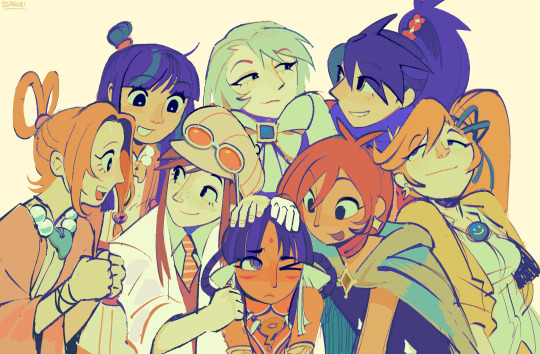[He/They] Storyboard Artist and Character Designer 🇺🇦 I feel like a human circus doing all the shit at once while the audience is having a blast watching me try🤡
Don't wanna be here? Send us removal request.
Text

every time.
37K notes
·
View notes
Text
Rewatching Treasure Planet (great movie, watch it) made realize something about the way that stories convey information to their audiences. There's been a lot of discussion on the overuse of plot twists and how many stories prioritise surprising their audience over telling decent stories. However, if you instead reveal the "twist" to the audience before it becomes known to the characters, you can build tension and stakes. Treasure Planet comes right out and tells you that Long John Silver is the main villain almost immediately after his introduction (And even before he's introduced we're warned about a cyborg, so you'd have to be pretty dense to not put 2 and 2 together and realize he's a bad guy). So when the audience watches him and Jim bond and grow closer, it builds tension for when Jim finds out and it highlights the tragedy of their friendship, because we all know it's not going to end well. Then, after the truth is revealed, stakes are created because we want the friendship between Jim and Silver to be repaired, because we know it was real, but we don't know if can be after what Silver's done. And all of this would have been lost if Silver's true nature had been a cheap plot twist. The tragedy would be completely overshadowed by the surprise and betrayal, and any investment in their relationship would have been built on the false impression that Silver was a good guy.
Another good example of this is Titanic. Even if you were somehow ignorant of the ship's sinking, the film makes sure you know that it sank with its framing device of Old Rose telling her story to people salvaging the Titanic's wreak. And Titanic's plot structure could only possibly work if you know the ship is going to sink. I'm not just talking about building tension, tragedy, and stakes for the characters like with the above example, I mean that if you didn't know that the Titanic was going down walking into the film, the abrupt shift from romance to suspense-disaster would be an increadibly tough pill to swallow. But it works because we expect it. You don't walk into a film called Titanic without expecting the damn boat to sink.
However, the sad thing about both of these examples, is that despite all the benefits that came from telling the audience these things ahead of time, I think the main reason the creators didn't make them plot twists was because they couldn't have. Treasure Island is the single most influential piece of pirate media out there, and you'd have to have been living under a rock for over a century to not know the Titanic sank. So, the writers had to work around the fact that these important turning points in the narratives were common knowledge, and they wound creating incredible stories as a consequence.
I want to see more of this style of writing in stories where the writers aren't forced to do it. We've clearly seen that you can tell some really damn good stories by giving information to the audience before the characters learn it, and I just wish more works would do that instead of trying to surprise people with shocking twists.
#and both of those amazing stories are happening on a fucking boat#we should also base more stories around boats I think there's something there#anyway watch Treasure Planet#treasure planet
16K notes
·
View notes
Text
occasionally I still see people complaining abt top/bottom discourse in fandom and like. my hot take? they don’t have to have penetrative sex at all 😭
#oh finally someone gets me#i mean I love porn without plot as much as the next guy#but when the porn IS plot it has to make some sense#also I almost never put the characters in my ships ibto top/bittom category#because first of all they don't have to fuck#second of all penetration isn't always the answer#thrid of all I like my switches#please let them switch it's so fun
27K notes
·
View notes
Text
I've always looked at cartoon depiction of women as caricatures, because I saw what real girls look like and they don't have those tiny waists, small pointy noses and perfectly slick hips. Like it's just not how real life proportions work, it's an exaggeration, right?
Except now I do a lot more people watching (that's a totally normal and not creepy thing to do if you're an animator/designer which I am) and I look at some girls and they're just??? Built exactly like that??? How is your head bigger than your waist??? It's possible in real life??? Like girls just CAN BE that cartoonishly tiny???
And I mean that in a sense that I always viewed most cartoon depictions of women as a beauty propaganda preaching unrealistic standards for girls, and, it still kinda checks out, but now I see that the problem is not that they're unrealistic, but the lack of variety in body shapes.
But some of y'all are actually built like anime girls and it's kinda blowing my mind
#no body shaming#all bodies are beautiful#just for a person who mostly only watches cartoons sone are more surprising than the others#girls are just something#design#body shapes#thoughts#text post
14 notes
·
View notes
Text

Felt like drawing some FMA fanart again. The background perspective doesn't make any sense so just don't look there
#fma#fmab#fullmetal alchemist fanart#fullmetal alchemist#fullmetal alchimist brotherhood#edward elric#alphonse elric#elric brothers#fanart
684 notes
·
View notes
Text
Another interesting meta I think it would be interesting to talk (or rather focus on, since I mentioned it briefly) about from the worldbuilding in Bartseq, is how Bartimaeus — and other spirits, at least by some extent — are out of perception of human understanding of aging.
It's not that they don't have a canon age, they do — Bartimaeus is about 5015 by then end of the Trilogy and Faquarl, who is canonically 5 years older than him, is about 5020. In human understanding, they are ancient.
However, our brain cannot understand how someone who is five thousand years of age would act, since no human would ever be than old. Therefore, as I touched upon the subject here, all of the fantasy authors treat the supernatural ages as, well, a fantasy element, as they still have to "sort" the character into some actual human age — a child, a teen, a young adult, an adult. That is usually determined by the character's permanent human look (e.g what age they look like), accompanied by their behaviour or mental state, generally the way they act that is also constant at all times. It is, in fact, a really popular trope to have an immortal character to be a kid/teen in a YA story, as to make a character more relatable to the target audience (Twilight is, ironically, the first thing that came to my mind, but there's way more). And, on the contrary, adult books/fiction authors' in general tend to make their immortal character look and act around 20-30 for a similar reason (see: a huge percentage of modern romatasy books)
Bartimaeus of Uruk is...way more complicated than any of that. Don't get me wrong, his age tracks, you can tell he's been here and seen stuff, as he oftenly reminds to the reader, you can see that he gains new experience and knowledge and well, trauma. In the understanding of a "mental human age", however, I tend to think he doesn't really have one.
He's not a human child, for sure, but calling him a human adult, would be just as wrong, the same way he's nor a woman nor a man, nor a human nor an animal, nor a blonde nor a brunette. All of these are human boxes, which spirits can never fully aling themselves with, since they were never humans in the first place. Stroud compared being dragged out of the OP to being born (and that's a valid comparacement, although I think newly summoned spirit picks up everything a thousand times faster then a newborn, as Bart was already flying around and stealing stuff for the Sumerians at his first summons), but that's where the comparison between us and then ends — to be a human adult you have to be a human child, and to be a human child you have to be a human. A lot of modern fantasy tend to ignore that fact and just put character in a box of a human age, but JS is way smarter than that.
Bartimaeus doesn't have a constant human appearance. He tends to be a kid (out of grief and memory, since that's a very specific kid), or young adult before that kid was there, but in general there's no human appearance he fully matches his behaviour with. He sees his forms as separate from him, oftenly even describing them as an outside observer — "the crow flee", "the boy smiled" while describing his own movement in 1st person. Same with his behaviour, a reader can stick them more to one age or another depending on their personal interpretation and even their own age, yet he doesn't really try to act like a human kid, or a human teen, or a human adult, unless the cover requires though. He can be a terrifying all-knowing scary entity in one scene, then go and complain about not being able to wear a pilot glasses to the plane, all while exchanging jokes and prickly comments with a fourteen year old.
What I mean by that, is that we don't know the way spirits are maturing or even If there's a concept of "maturity" within their own species, and therefore it would be way less interesting to just put Bart in a role of a "grown man" or just envision him as a young boy Ptoemy was. Narratively, he's all of that and also an ancient entity, just all spirits are. The amount of human!Barts of different ages I've seen in fanfiction and how none of them seem OOC no matter what age you pick! It's such a wonderful place for the game of imagination, and a full mastery of making a character so truly inhuman there's nothing about him that checks the usual "human" or even "fictional immortal-is-actually-twenty" boxes.
And it's such an interesting concept to explore.
#what a great analysis#that's what we love to see#we're all here petting strouds ass for being a genius and honestly he deserves it#I wander if the spirit's “maturity” or intelligence can vary from one race to another or is it just racism based on their power scale#like Bart calls foliots and imps stupid and incapable of doing almost any work apart fron chores but are they really the inferior species?#since we've seen from the example of Ammet and Nouda a much higher ranking spirits than bart#they are not that much more intelligent than djinnis are just more powerful#it's not really the topic of discussion but I still wonder about that sometimes#bartimaeus#bart seq
15 notes
·
View notes
Text
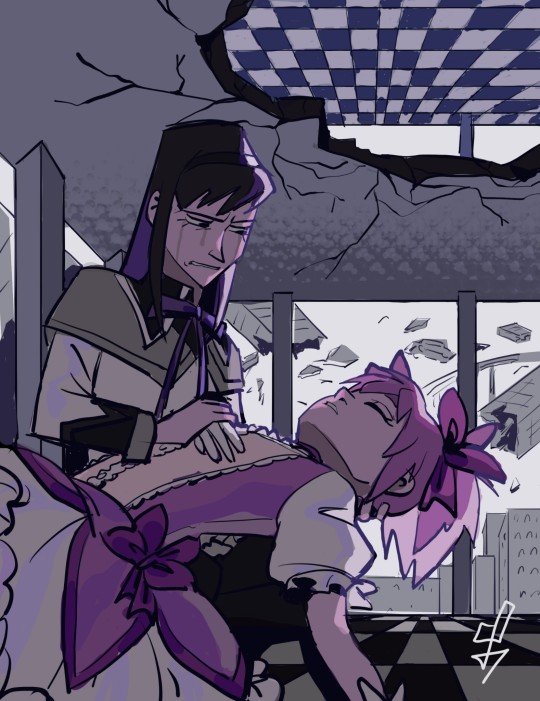
All hail doomed magical girl yuri🧚♀️
I came to a sudden realization that most of my art is very dark... Probably because DARK is my favorite genre mhahahsha
#puella magi madoka magica#madoka magica#madoka kaname#homura akemi#madoka x homura#homumado#madoka magika fanart#fanart#illustration#doomed yuri
370 notes
·
View notes
Text
Nathaniel's arc in PG can be a very interesting and thoughtful parallel to unhealthy dependency/co-dependancy with a person and I really want to talk about it more.
The most interesting thing is, all of the pain Nathaniel inflicted on Bartimaeus was not because he had an aim to actively harm him (and magicians, being complete morons they are, have plenty resources to do that.), it was specifically because he refused to let him go. Not than in any way erases or justifies the harm that was already done, both the readers and Nathaniel himself are fully aware of that (in fact, it's a very important point in Nathaniel's arc, the understanding that he can't run from a harm that was already done), but it's very interesting that his treatment of Bartimaeus in this specific section is fully made by his inability to let go, both physically and mentally.
He knows it hurts Bartimaeus, and he knows it hurts him as well (as a worker for the government, in the very least, as a person in the very most. Remember, Bartimaeus knows his name and he can kill him If he really wants so, as was noted in the OP scene, in a dialogue between Bart and Kitty in PG), but he doesn't seem to even start considering going on with his life without Bartimaeus in it, clinging to him as both the closest thing he has for a friend or a companion or even just a person that knows him as he is, and the only reminder of that part of himself he tries so hard to bury inside himself and yet cannot bear the idea of losing it completely. In a way, he really does try to put his own feelings and sentiments after someone elses, not because Bartimaeus is a slave or a servant, but because he is a person, memory to which he tries to grasp similar to the drowning person catching their fingers on a thin tread of silk — not even a rope.
His arc is very openly about being unable to let someone out of your life even when you know that's what's you're supposed to do, that that's something that would only benefit both to you in them. It is also about the selfishness that stands in the core of this feeling, the desire to be something and with someone so deep it strives even If it brings you — and most importantly them, the person you are so terribly dependent on — pain.
It's very visibly a pattern in his relationship with humans as well. He can't keep them with him physically — although I'd argue he tries, one way or another — but he does oftenly puts his inner problems and hopes into the images of people who left his life a long time ago. Him trying so hard to be in contact with miss. Lutyens the second anything goes wrong with his life, his mind being constantly fixated on her as someone unambiguously good, and, just as Bartimaeus, symbolises that part of his life in which he had something to stand by. Him bearing the image of Kitty as something almost paradoxical, the mythical legend of bravery and "unreasonable" kindness which he kept inside for so long she almost stopped being a real person — part of a reason why he was so crushed when he learnt that she's alive and cannot any longer stay a graceful figure in his head. The only difference is, he can't keep them here with them, he can't force him to be there, and he can keep Bartimaeus. In his mind, that's the connection he has a control of. It takes him time and a lot of stress to realize that he does, in fact, cares about Bartimaeus more than that he cares about that sentiment, than his work and his career, too much time not to die in self-guilt in the end.
And that's a part of why his decision to let Bartimaeus go was so important. Not only does it brings a great closure to his arc, not keeping away any of the previous meta about slavery and opression, but also it's him finally learning to, quite literally this time, let someone go.
#ong its so well explained here#my mind always howered around this idea but I never marked it as a “codependency” topic and it just makes so much sensw#absolutely love this and absolutely agree#this works so well for the metaphpr for all kinds of toxic relationships#the bartimaeus sequence#bartimaeus trilogy
24 notes
·
View notes
Text



[id: three grey-scale digital drawings of characters from Lockwood and Co books set in a modern coffee shop setting.
Lucy sits on a couch in a dark room, she looks at her phone puzzled. right side of the picture is divided horizontally into three frames: a close up of the phone with a cut off discord missed call notifications; Lucy looking annoyed and putting her phone aside; a cup with a teabag in it on the floor.
Lockwood is leaning on the barista counter from customer side, he's saying something with a smile, speech bubble has emojis of calendar and question mark. he looks at Lucy, who's turned away from viewer as she's making coffee. from her apron's front pocket comes a speech bubble with emojis of vibrating phone, skull, exclamation and question marks.
a view on coffee shop from behind front windows. from barista counter Holly leans towards Lockwood, who's standing near by with his brew, she says something to him in secretive manner. on the foreground, leaning back on the window Lucy is talking on a phone. she is cut off at the edge of the picture but there is a visible smile and a tiny blush on her face. there are two speech bubbles: from skull it has internet and handshake emojis, from Lucy: handshake and a question mark./end id]
@czenzo's modern au featuring skullyle bickering (flirting) in broad daylight. scenes from Missed Call on AO3, this fic has been eating my brain away no end
#love these!#so much life to those drawings#lockwood and co#lockwood & co#anthony lockwood#lucy carlyle#skull#skullyle
173 notes
·
View notes
Text
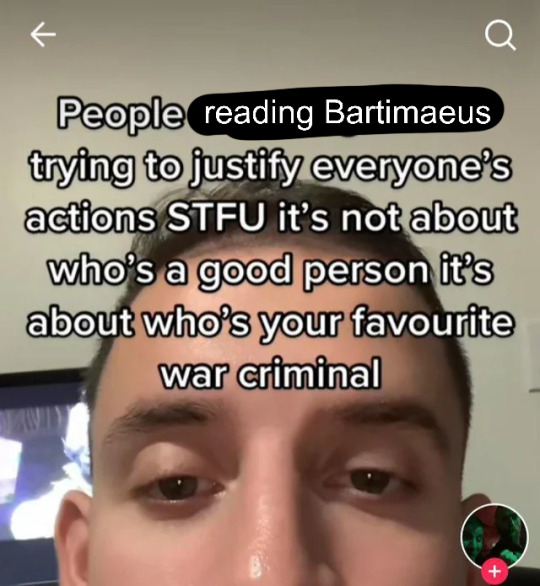
90 notes
·
View notes
Text
Lights and Shadows of Cyber City.
#devid tennants's voice: ... you did that??#blue-green-ghost: yeah just this morning#me still in devid tennant's voice: fuck off!!!#and so on and so forth#amazing#like I can't stop watching this#the animation is so expressive and so smooth and all of the characters are perfectly on model#I can't imagine how long this took#the timings!#the layout!!#deltarune fans are another breed of people#deltarune#animation
41K notes
·
View notes
Text
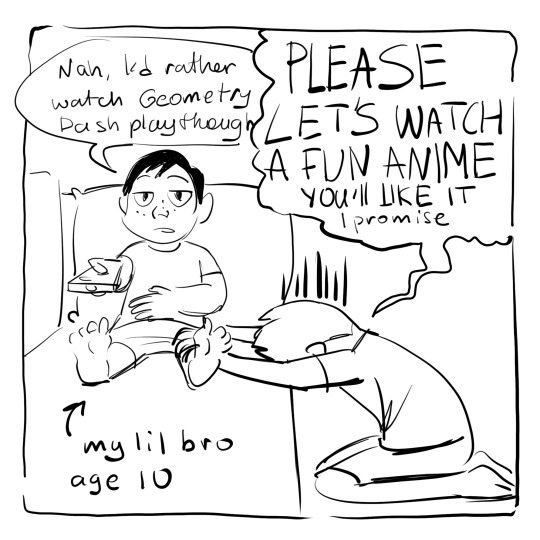
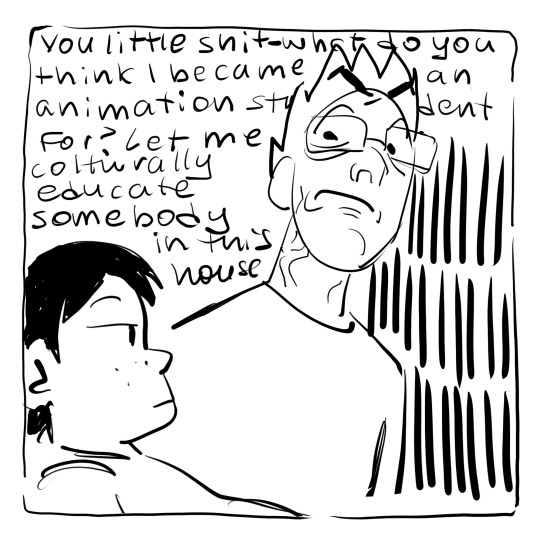
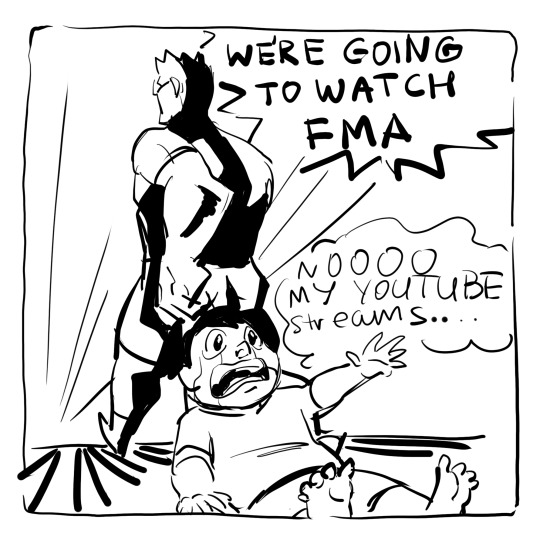
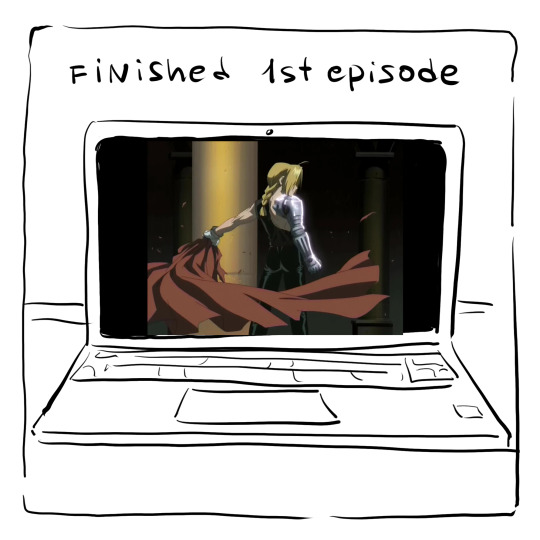
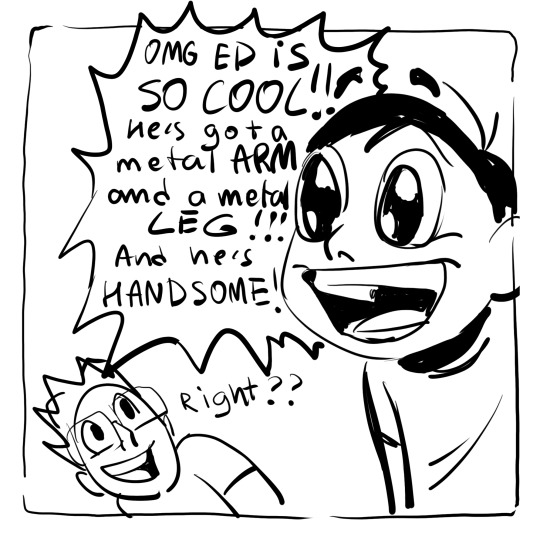
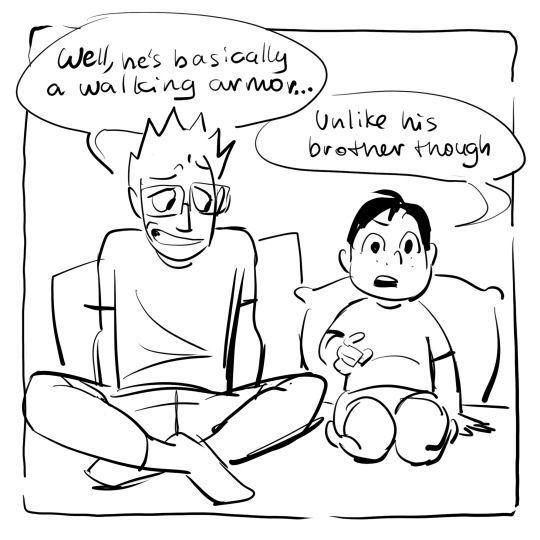
The experience of trying to culturally educate my brother in the only way I know how
59 notes
·
View notes
Text


emotional regulation with mob!
5/100
5K notes
·
View notes
Text
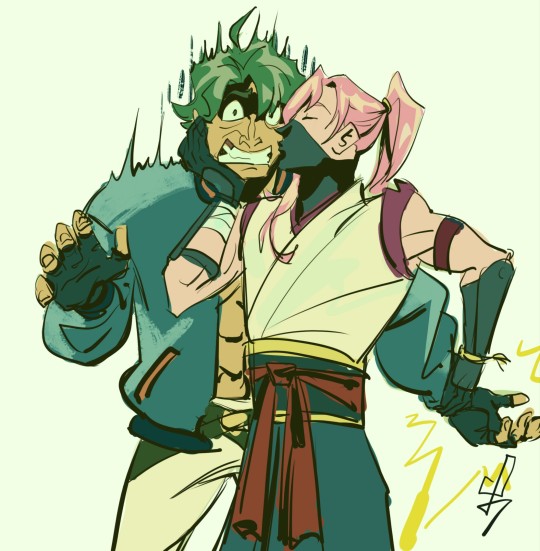
When you're trying to be PG+13 in public but your imbecile husband can't keep his gorilla hands to himself
#sk8#sk8 infinity#matchablossom#cherry blossom#sk8 joe#kojiro nanjo#kaoru sakurayashiki#sk8 fanart#sketch
459 notes
·
View notes
Video
This is still one of the greatest things ever made.
#oh my god this is pure gold#I'm fully convinced#fuck fullmetal alchemist brotherhood Im watching this next#after I finish Gurren Lagann Kill la kill Black Butler and Apothecary Dairies...
319K notes
·
View notes
Text

Just some shitty sketches to get my mind off work🐛
#bartimaeus#the bartimaeus sequence#fanart#the bartimaeus trilogy#nathaniel#john mandrake#bartimaeus trilogy#kitty jones#stroudverse#jonathan stroud#bartimaeus fanart#sketches
74 notes
·
View notes
